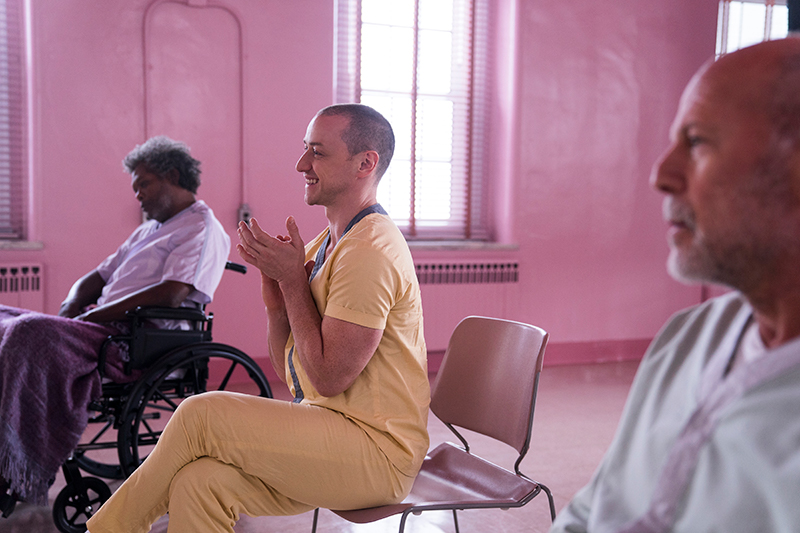Glass

(L-R) Samuel L. Jackson as Elijah Price/Mr. Glass, James McAvoy as Kevin Wendell Crumb/The Horde, and Bruce Willis as David Dunn/The Overseer in GLASS.
A gang of teen hoodlums runs about town, recording their random beatings of strangers and posting them to social media. Aside from the stilted dialogue, we’ve immediately a sense of just how dated the film’s sensibilities are. In the obligatory twist ending, there’s a viral video concept that strains credibility because we live in world flooded with information where this denouement would flash in the panoply of laptops, tablets, smartphones, and smartwatches.
In a pre-screening title card, writer/director M. Night Shyamalan gives us the standard “spoilers” plea and extols the nineteen years which it took to write GLASS. Nearly two decades after Shyamalan’s master-stroke, UNBREAKABLE, after falling from his pedestal with subsequent fare, M. Night squanders a comeback opportunity afforded few.
David Dunn (Bruce Willis) operates a home security storefront in Philadelphia as a staging area in his search for a villain with twenty-four personalities, collectively known as The Horde (James McAvoy)—introduced in the director’s psychological thriller, SPLIT. Intended mostly as a repudiation of comic book franchises, and a middle finger to his critics, GLASS ironically depends entirely on one’s familiarity with the aforementioned material.
After Dunn locates and frees The Horde’s latest victims—a group of cheerleaders handcuffed to a rail in an abandoned factory—police close in and capture the two adversaries with the assistance of a mysterious woman, Dr. Ellie Staple (Sarah Paulson). The cops inexplicably remand the two men to her custody. She appears to be a psychiatrist at Ravenhill Memorial Hospital (the now-shuttered Allentown State Hospital), a peculiar facility with scant staff and only one orderly working the night shift. Oddly, Dunn, a.k.a. the Overseer, isn’t jailed but put in a cell directly across the hall from The Horde, whose dominant personality is like a bison crossed with a parkour lad.
Shyamalan frequently sets up his films as a straw man rejection of rational skepticism. But there’s always been this sense that he doesn’t do his research as a writer to mete out his thesis. SPLIT received criticism from various advocacy groups for romanticizing the trauma suffered by abuse victims and mischaracterizing Dissociative Identity Disorder. In GLASS one of these many personalities, a nine-year old boy named Hedwig, tells of the Beast who protects, “The masses of the unbroken.” If that’s the case, then why does he abduct teenage girls—among the most vulnerable, denigrated and victimized in society?
Casey Cooke (Anya Taylor-Joy), the survivor from SPLIT, appears just as (and only when) the story needs her. Having put her abusive uncle in jail (it’s just that easy?), the school principal calls her into the office. She informs Casey of her abductor’s apprehension by authorities, declaring mono-syllabically in reductive moviespeak, “They got him!”
So, Casey’s next move is to visit the asylum to try to coax out her abductor’s real self, Kevin Wendell Crumb, to put an end to the Beast’s reign over him and the other identities in his head? Again, you’d have to see SPLIT to know that Crumb was abused by his mother following an accident that killed his father. This plot point that resurfaces as a surprise only to those who have no idea who Kevin is. If you think Anya Taylor-Joy is wasted in this movie, just know that Samuel L. Jackson, who plays the titular criminal mastermind Mr. Glass, spends the entire first half of the film performing in a catatonic stupor. And so do we.
Granted, to the extent that he’s weaving fiction, the insensitivities and lapses of logic are mostly benign but Shyamalan’s insistence on “grounding” stories in a reality that’s poorly fleshed out stretches our ability to suspend disbelief. Shyamalan works best when he’s constrained either financially or narratively—as in the case of THE VISIT and this film’s narrowly-focused predecessor. When given virtually unlimited resources, like many other “Generals in the Arts” (as Kael would say), he’s tempted by his demons. GLASS’ third act descends into third-rate, fourth-wall allegorical self parody, in which unbelievers (critics) and adversaries (competitors or, as he sees them, imitators) are shot down.
Here the once-meticulous craftsman of UNBREAKABLE and THE SIXTH SENSE, who carefully assembled long takes into an intimately-crafted story, haphazardly slaps together 39 days of raw footage into a series of disjointed and meaningless dutch angles and untraceable plot twists. The auteur’s anger becomes comical as he literally murders the superhero franchise right before our rolling eyes.
But it’s probably the funniest nod to Philly I’ve ever seen. I can’t wait for the meta-meta parody where Paul Giamatti’s character in THE LADY IN THE WATER rises from the grave and screams, “I SAID PLOT HOLE, NOT POT HOLE.”